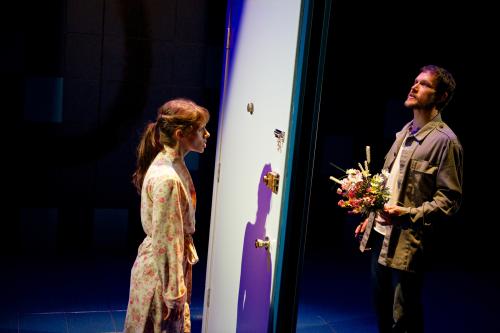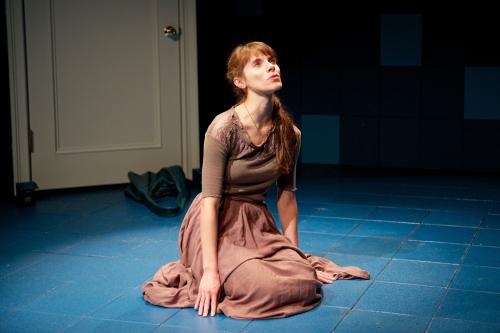

Well, H20 is a completely grabbing and affecting new play: this playwright and director always function skillfully. One of my friends at its performance was left sobbing uncontrollably by the finale. And both its acting roles are demanding showcases. But I don’t know how many observers or performers will want to return to it.
H2O can certainly mean “water” here; we get symbolic suggestions and several climactic bathtub scenes; and in a scene worthy of “La Dolce Vita,” the woman baptizes the man in a fountain just inside a crowded restaurant. Shakespeare’s Hamlet has several references to drowning and Ophelia’s tragic actual one; and our lead female is obsessed with playing Ophelia. But what the title mostly wants to express is Hamlet and Ophelia Squared.
We start with a seductive lament and confession by a very pretty young woman who expresses her conflict between wanting to become a nun to realize her “born-again” dedication to Christian belief and chastity and honesty vs. her “feminism,” which she says underlies her great desire to express herself as an actress. She has an unshakeable belief that she would be a great Ophelia in Hamlet. So she calls to arrange an audition and is just miffed to be rejected.
Then, when she gets accepted and goes to a famous and studly new star’s apartment to audition, she must save him from attempting suicide, angering him by intruding. But then she comes to represent hope for him, as she tries to be less straitlaced, and he tries to get her unlaced. Jake is a handsome daredevil who has become a famed and lusted-after TV action-star; Deborah persuades him that she is an expert actress. He comes to believe that she can save him from despair and self-loathing; she decides that she does love him and becomes something like engaged to him; and they start to find satisfaction in rehearsal scenes from Shakespeare’s Hamlet.
Spoiler alert: here are both what happens and what annoys me about it. The conflict between his wary acceptance of her unusually selfish form of Christianity and her almost teasing physical attraction to him at first hides his basic self-loathing and insecurity and her ultimate refusal to ever accept a sexual role of any kind. He offers her valuable jewelry as a token of his genuine devotion; she rejects it as a pledge of eventual loss of virginity. He then turns what seemed like an odd but touching love and accommodation into a nasty attack on the cruelty of such righteous selfishness as she represents.
At the final actual opening-night performance of the Hamlet that too much is dependent upon, she gives him his jewels and rejects him onstage, and he drops out of character, virtually cursing her for her denial of his loving hope of salvation through her. He storms out, refusing to complete the play. After stewing for a time, she goes to apologize and, repeating their early meeting, finds him bleeding in the same tub in the same apartment, this time finally. Of the seemingly infinite interpretations of Shakespeare’s Hamlet that a few doctoral candidates were privileged to study many decades ago in a seminar with the great Shakespeare scholar, James G. McManaway, the one that seemed most aggravating to me suggested fairly persuasively that after all the startling conflicts and developments suffered by Prince Hamlet, he ends his life and the great play without really having developed at all. So H2O seems to give up all of its involving struggle and makes that same decision. Hamlet does not really develop but ends as he began -- an attractive but victimized, self-doubting, self-destructive outsider. Hamlet-and-Ophelia-squared turn out to fatally split the atom, but the ‘isms’ bring considerable discomfort to that result. It is not unusual to associate born-again evangelism with persecution (chastity equated with chastisement), but it’s difficult to accept the author/director duo of "Jane Martin" and Jon Jory’s confusion here of feminism with cannibalism. Diane Mair creates an impressive mixture of ingénue with strong character-actress to give us a Deborah/Ophelia who veers between innocence and violent insistence on remaining inviolate. Lillian Gish, who played Ophelia to John Gielgud’s Hamlet, once remarked that “Shakespeare really did write that role for a boy: there’s not an ounce of woman in her!” And Martin, Jory and Mair play with that idea to both embrace and reject it.
Alex Podulke is a nice mix of Adonis and Hephaestus, playing a strong, virile warrior who has been mentally crippled by his war experiences and yet both exhilarated and weakened by the admiration of others. His Jake and Hamlet seem precariously close to triumph and disaster all at once.
I think the play leads both to pathos and disappointing failure, but these charismatic actors involve us enough to keep hoping.
